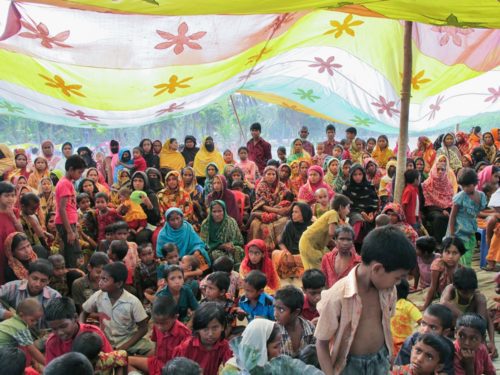By Stefanie Casdorph
At the beginning of the new millennium, world leaders gathered at the United Nations to shape a broad vision to fight poverty and its many causes and effects. This vision turned into the Millennium Development Goals (MDGs), eight goals that pledged to the world to fight for the principles of human dignity, equality, equity, and to free the world from extreme poverty.
Bread for the World has long supported the MDGs as a way to help the world’s poor move out of a cycle of hunger and poverty.
The MDGs addressed the important issues of poverty, education, women’s empowerment, health, children’s well-being, and the environment.
The first MDG was to eradicate extreme poverty and hunger. This goal had three objectives:
- Halve, between 1990 and 2015, the proportion of people whose income is less than $1 a day.
- Achieve full and productive employment and decent work for all, including women and young people.
- Halve, between 1990 and 2015, the proportion of people who suffer from hunger.
The United Nation’s MDG Report 2015 findings show that the world has made significant strides in fighting poverty and hunger under these goals. Although poverty is far from eradicated, here are some examples of progress that has been made in the last 25 years, according to the report:
- The number of people living in extreme poverty around the world has fallen by more than half, from 1.9 billion in 1990 to 836 million in 2015.
- In developing regions, the proportion of people living on less than $1.25 a day fell from 47 percent in 1990 to 22 percent in 2010, five years ahead of schedule.
- The proportion of undernourished people in developing countries has fallen by almost half, from 23.3 percent in 1990 to 12.9 percent in 2015.
- The number of undernourished people in developing countries has fallen by 216 million since 1990.
- The proportion of children under five who are underweight has been cut almost in half between 1990 and 2015. One in four children under five worldwide have stunted growth, but stunting – defined as inadequate height for age – is declining.
These goals have helped the world achieve so much. Millions of people around the world are escaping hunger and poverty. However, even after making such great strides, there are still over 795 million people going hungry.
The world has the tools and the knowledge to eradicate hunger. Using the momentum and progress generated by the MDGs, the U.N. is working with governments, civil society, and other partners on an ambitious task in creating a long-term sustainable agenda – the Sustainable Development Goals.
These new goals will replace the MDGs this September with an end goal of ending extreme poverty by 2030.
Stefanie Casdorph is a summer intern in the communications department at Bread for the World.



